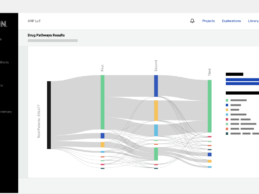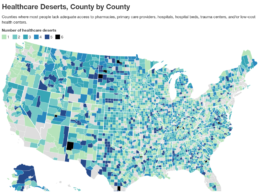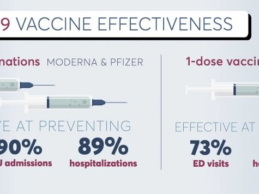What You Should Know:
- Aetion, a NYC-based leading real-world evidence (RWE) company, announced that the U.S. Food and Drug Administration (FDA) has contracted with them to use their Aetion Evidence Platform® to rapidly assess in-patient COVID-19 treatments and advance regulatory science to help determine when, where and how to use RWD.
- This project is designed to demonstrate how using a platform-based approach
Read More
Coronavirus (COVID-19)
10 Tips for Improving COVID-19 Employee Immunization Initiatives
Within the past 18 months, what used to be a relatively simple process for organizations providing healthcare services – ensuring their employees had required and recommended vaccines – has gotten contentious and complicated – to say the least.
The rise of the COVID-19 Delta variant and new immunization mandates creates concerns and complexities for hospitals, nursing homes, long-term care and other providers. As of early October, the CDC has approved Pfizer booster
Read More
Lessons Learned: The Impact of COVID-19 on Infusion Center Scheduling
Over the past year, COVID-19 brought new stresses to hospital scheduling, given limited resources, physician availability, staffing challenges and physical materials. Beyond the obvious struggles with ICU capacity, COVID-19 also put a heavy strain on every step of the chemotherapy patient journey – from navigating new scheduling protocols to pre-screening to delays in diagnosis to reconfigured, socially distanced waiting rooms and treatment chairs. As we continue to navigate the pandemic, many
Read More
Leveraging Technology to Optimize Staffing Shortages Post-Pandemic
Chronic understaffing and nurse burnout are two of the greatest and long-standing challenges within the healthcare industry. As a result of the pandemic, these challenges were acknowledged more than ever before. Pre-pandemic research highlighted the fact that the nurse vacancy rate in the United States was 9% at the start of 2020, while the average turnover of bedside nurses was 17%. These trends have only accelerated during COVID-19 and during this period of transitioning into a new normal.
Read More
Telehealth: Short-Term Fad or Key to Improving Access to Affordable Healthcare?
While telehealth offerings have always held great promise, prior to 2020, their success was sometimes hindered by provider hesitation to adopt the technology, consumer reluctance to using virtual care, and a reimbursement methodology that did not value the investments required by providers or the positive impact on patients.
That all changed practically overnight when COVID-19 struck.
Use of telehealth spiked to more than 32% of office and outpatient visits by April 2020, thanks in
Read More
Healthcare Deserts: 80% of U.S. Lacks Adequate Access to Healthcare
What You Should Know:
- Over 80 percent of the country lacks adequate healthcare infrastructure in some shape or form, according to recent report findings from GoodRx Research. The research finds that over a third of the U.S. population lives in a county where there is less than adequate access to pharmacies, primary care providers, hospitals, trauma centers, and/or low-cost health centers.
- The report offers an in-depth look at the uneven distribution of healthcare across the
Read More
EHR Data Reveals COVID-19 Vaccines Effective in Preventing Hospitalizations, ER Visits
What You Should Know:
- Real world evidence from electronic medical records (EHR) data reveals the COVID-19 vaccines are highly effective at preventing hospitalizations, emergency department visits and intensive care admissions due to the virus, according to a study just published in the New England Journal of Medicine (NEJM).
- The study, “Effectiveness of COVID-19 Vaccines in Preventing Ambulatory and Inpatient Care” analyzes actual data from hospitals around the US and shows
Read More
How Healthcare Can Weaponize Data to Fight Worldwide Disease
After more than a year since COVID-19 became a global pandemic, we now understand that part of the challenge in fighting it, and any infectious disease, is solving the underlying data problem.
Without reliable data, leaders can’t plan, epidemiologists can’t model, and citizens don’t feel confident following expert recommendations. Bad data has led to both poor behavioral and policy-oriented decisions, exacerbating COVID-19 and prolonging its consequences.
It’s not purely a data problem,
Read More
How AI Helped Companies Survive COVID-19: 5 Tips for Resilience
As the coronavirus pandemic transformed workplaces and workflows, it cast a spotlight on service management and resilient systems. Here are key lessons in how AI can improve your company’s operations moving forward.
The coronavirus pandemic inaugurated a revolution in the workplace as millions of employees shifted to working remotely to stop the spread of the virus. It also expedited digital acceleration across industries, testing the resilience and scalability of service management
Read More
Why We Need a Personalized Approach to COVID-19 Immunity Testing
To date, the battle against COVID-19 has been waged largely in the field of public health, using a series of binary, black-and-white thresholds to measure progress. The number of positive cases per 100,000 people, yes/no results on PCR tests, absence or presence of antibodies – these have set the benchmarks used to determine when we can open our schools and restaurants, remove our masks and resume something resembling our old routines.
While these numbers do tell us something about the
Read More










